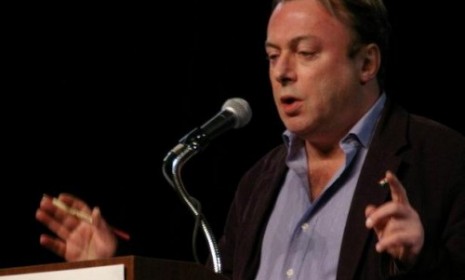Christopher Hitchens: 6 influential books
The author, journalist, and critic lists six titles that helped him shape his new memoir, Hitch-22

A free daily email with the biggest news stories of the day – and the best features from TheWeek.com
You are now subscribed
Your newsletter sign-up was successful
How Green Was My Valley by Richard Llewellyn (Scribner, $16). The story of a Welsh coal-mining community, as related by a boy named Huw Morgan, this novel had a seismic effect on me when I was young, showing as it did the existence of another class of people—and another nation speaking a separate language—within the British Isles. It captures a vanished age.
Darkness at Noon by Arthur Koestler (Scribner, $15). Long before Solzhenitsyn, this Hungarian refugee (who had only endured actual prison under Franco’s fascism) managed to imagine the workings of Stalin’s secret jails. Along with Animal Farm and Nineteen Eighty-Four, it formed part of the essential bookshelf of those intellectuals who repudiated their early illusions about the Soviet Union.
A Dance to the Music of Time by Anthony Powell (Univ. of Chicago, $96). This is actually 12 novels in one and forms a sequence that spans English society from the Edwardian era to the ’60s. Often wrongly thought to be too toffish and upper crust, Powell’s set pieces and ironic investigations are a marvelously evocative achievement.
The Week
Escape your echo chamber. Get the facts behind the news, plus analysis from multiple perspectives.

Sign up for The Week's Free Newsletters
From our morning news briefing to a weekly Good News Newsletter, get the best of The Week delivered directly to your inbox.
From our morning news briefing to a weekly Good News Newsletter, get the best of The Week delivered directly to your inbox.
Money by Martin Amis (Penguin, $15). The Anglo-American adventures of Amis’ most fully realized creation, the outsize John Self. This addict of booze, cigarettes, junk food, and pornography is barely able to speak except in grunts, but his eloquently rendered inner life shows a richness and tenderness and a queasy awareness that things are about to go terribly wrong. When they do, you will laugh very hard indeed.
The Satanic Verses by Salman Rushdie (Random House, $16). Can “holy writ” be used for literary purposes? This brilliant novel, with its deft and sinuous discussions of Koranic text (and its satire on British society), answers yes. The Satanic Verses began a great battle between the ironic mind and the literal mind that is still going on.
The Memory of War by James Fenton (out of print). How strange it is that the war in Indochina produced so little by way of poetry. But these gems, written from Vietnam and Cambodia by a young man who combined the roles of poet and foreign correspondent, are full of the observant and humane quality that the best poetry always exhibits.
—Christopher Hitchens is an author, journalist, and critic whose new memoir, Hitch-22, is available
A free daily email with the biggest news stories of the day – and the best features from TheWeek.com